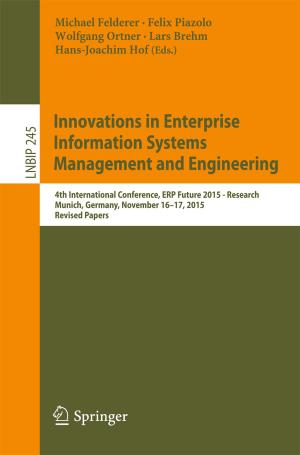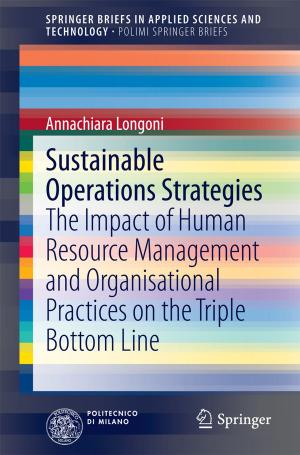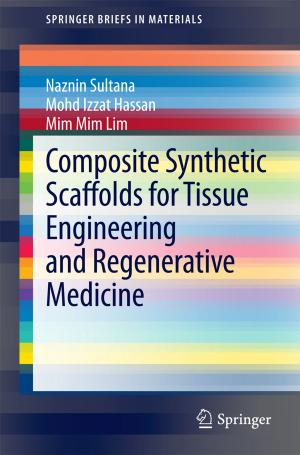Towards a Post-Bertalanffy Systemics
Business & Finance, Management & Leadership, Operations Research, Nonfiction, Science & Nature, Mathematics, Applied| Author: | ISBN: | 9783319243917 | |
| Publisher: | Springer International Publishing | Publication: | December 23, 2015 |
| Imprint: | Springer | Language: | English |
| Author: | |
| ISBN: | 9783319243917 |
| Publisher: | Springer International Publishing |
| Publication: | December 23, 2015 |
| Imprint: | Springer |
| Language: | English |
This book contains the proceedings of the Sixth National Conference of the Italian Systems Society. The title, Towards a post-Bertalanffy Systemics, aims to underline the need for Systemics and Systems Science to generalize theoretically concepts related to complexity (the great enemy of Bertalanffy Systemics). Hopefully this goal should be achieved by working in an inter-disciplinary and trans-disciplinary fashion, using systemic concepts arising from various disciplines and from the original, or Bertalanffy Systemics, as well. The interdisciplinary nature of the original Systemics and its power of generalization were given, overall, by the fact that the problems and solutions of one discipline become problems and solutions for another. Today, the modeling and interpretation of multidisciplinary approaches and representations makes easier to recognize these interconnections. The context, however, has changed dramatically. Of course, the challenge is still to find theoretical generalizations and applications, even where we have a lot of specificities, but we know very little on how to combine them. We cannot, however, simply replace the old with the new, but we must introduce strategies to recognize, represent, model and act on new levels, combining multiple representations, functions and emergence. In many disciplines this has been already done, and inevitably well, since targets and projects are well specified and oriented. The challenge is to do it for Systemics, with the vocations of cultural and theoretical generalization. Examples of new issues introduced by such theoretical disciplinary improvements, dealt with by many disciplines, include the study of mesoscopic or middle-way level, of multiple and dynamic coherence, of equivalence/non-equivalence, of fractality, of networks, of non-causality, of non-invasiveness, of non-prescribability, of non-separability, of quasi properties, of symmetry properties, of topological dynamics, as well as of quantum theories and concepts.
The conference was devoted to identifying, discussing and understanding possible interrelationships of theoretical disciplinary improvements, recognized as having prospective fundamental roles for a new post-Bertalanffy Systemics. The latter should be able to deal with problems related to complexity in a generalized way. In this context the inter-disciplinarity should consists, for instance, in a disciplinary reformulation of problems, as from algebraic to geometrical, from military to political, from biological to chemical, while the trans-disciplinarity should be related to the study of such reformulations and their properties.
The Italian Systems Society (AIRS) was founded in the 1996. The AIRS is a network of academicians, scientists, researchers and professionals involved in Systemics. A partial list of disciplines represented is:
Architecture
Biology
Economics
Education
Engineering
Mathematics
Neurosciences
Medicine
Music
Philosophy
Psychology
Physics.
Previous conferences had as open lecturers professors Arecchi, Haken, Klir, and Kauffman. The proceedings have been published as:
-
Minati, G., (ed.), (1998), Proceedings of the first Italian Conference on Systemics, Apogeo Scientifica, Milan, Italy.
-
Minati, G., and Pessa, E., (eds.) (2002), Emergence in Complex Cognitive, Social and Biological Systems. Kluwer, New York.
-
Minati, G., Pessa, E., and Abram, M., (eds.), (2006), Systemics of Emergence: Research and Applications. Springer, New York.
-
Minati, G., Abram, M. and Pessa, E., (eds.), (2009), Processes of emergence of systems and systemic properties. Towards a general theory of emergence. World Scientific, Singapore.
-
Minati, G., Abram, M. and Pessa, E., (eds.), (2012), Methods, Models, simulations and approaches - towards a general theory of change. World Scientific, Singapore.
This book contains the proceedings of the Sixth National Conference of the Italian Systems Society. The title, Towards a post-Bertalanffy Systemics, aims to underline the need for Systemics and Systems Science to generalize theoretically concepts related to complexity (the great enemy of Bertalanffy Systemics). Hopefully this goal should be achieved by working in an inter-disciplinary and trans-disciplinary fashion, using systemic concepts arising from various disciplines and from the original, or Bertalanffy Systemics, as well. The interdisciplinary nature of the original Systemics and its power of generalization were given, overall, by the fact that the problems and solutions of one discipline become problems and solutions for another. Today, the modeling and interpretation of multidisciplinary approaches and representations makes easier to recognize these interconnections. The context, however, has changed dramatically. Of course, the challenge is still to find theoretical generalizations and applications, even where we have a lot of specificities, but we know very little on how to combine them. We cannot, however, simply replace the old with the new, but we must introduce strategies to recognize, represent, model and act on new levels, combining multiple representations, functions and emergence. In many disciplines this has been already done, and inevitably well, since targets and projects are well specified and oriented. The challenge is to do it for Systemics, with the vocations of cultural and theoretical generalization. Examples of new issues introduced by such theoretical disciplinary improvements, dealt with by many disciplines, include the study of mesoscopic or middle-way level, of multiple and dynamic coherence, of equivalence/non-equivalence, of fractality, of networks, of non-causality, of non-invasiveness, of non-prescribability, of non-separability, of quasi properties, of symmetry properties, of topological dynamics, as well as of quantum theories and concepts.
The conference was devoted to identifying, discussing and understanding possible interrelationships of theoretical disciplinary improvements, recognized as having prospective fundamental roles for a new post-Bertalanffy Systemics. The latter should be able to deal with problems related to complexity in a generalized way. In this context the inter-disciplinarity should consists, for instance, in a disciplinary reformulation of problems, as from algebraic to geometrical, from military to political, from biological to chemical, while the trans-disciplinarity should be related to the study of such reformulations and their properties.
The Italian Systems Society (AIRS) was founded in the 1996. The AIRS is a network of academicians, scientists, researchers and professionals involved in Systemics. A partial list of disciplines represented is:
Architecture
Biology
Economics
Education
Engineering
Mathematics
Neurosciences
Medicine
Music
Philosophy
Psychology
Physics.
Previous conferences had as open lecturers professors Arecchi, Haken, Klir, and Kauffman. The proceedings have been published as:
-
Minati, G., (ed.), (1998), Proceedings of the first Italian Conference on Systemics, Apogeo Scientifica, Milan, Italy.
-
Minati, G., and Pessa, E., (eds.) (2002), Emergence in Complex Cognitive, Social and Biological Systems. Kluwer, New York.
-
Minati, G., Pessa, E., and Abram, M., (eds.), (2006), Systemics of Emergence: Research and Applications. Springer, New York.
-
Minati, G., Abram, M. and Pessa, E., (eds.), (2009), Processes of emergence of systems and systemic properties. Towards a general theory of emergence. World Scientific, Singapore.
-
Minati, G., Abram, M. and Pessa, E., (eds.), (2012), Methods, Models, simulations and approaches - towards a general theory of change. World Scientific, Singapore.















